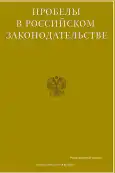К вопросу о привлечении переводчика к проведению процессуальных действий с участием иностранных граждан: вопросы теории и практики
- Авторы: Купряшина Е.А.1, Черкасова Е.А.2, Рудов Д.Н.3
-
Учреждения:
- Национальный исследовательский университет «БелГУ»
- Белгородский университет кооперации, экономики и права
- Белгородский Юридический институт МВД России имени И.Д. Путилина
- Выпуск: Том 15, № 1 (2022)
- Страницы: 109-113
- Раздел: Статьи
- URL: https://journal-vniispk.ru/2072-3164/article/view/147427
- ID: 147427
Цитировать
Аннотация
Полный текст
Открыть статью на сайте журналаОб авторах
Елена Александровна Купряшина
Национальный исследовательский университет «БелГУ»
Email: kupryashina@bsu.edu.ru
канд.юрид.наук, доцент, заведующая кафедрой уголовного права и процесса юридического института Белгород, Россия
Елена Анатольевна Черкасова
Белгородский университет кооперации, экономики и права
Email: elena.cherkasova.7878@mail.ru
канд.юрид.наук, доцент кафедры административного и уголовного права Белгород, Россия
Денис Николаевич Рудов
Белгородский Юридический институт МВД России имени И.Д. Путилина
Email: den.rudov2013@yandex.ru
канд.юрид.наук, доцент, заместитель начальника кафедры уголовного процесса Белгород, Россия
Список литературы
- Богаткина Р.Ш. Уголовно-процессуальные особенности производства отдельных следственных действий с участием иностранных граждан и лиц без гражданства / Р.Ш. Богаткина. // Вестник Казанского юридического института МВД России. - 2016. - № 2 (24). - С. 79-82. - Текст : непосредственный.
- Материалы, предоставленные Следственным управлением УМВД России по Белгородской области.
- Пимонов Б.В. Обеспечение права подозреваемого (обвиняемого) на использование помощи переводчика / Б.В. Пимонов. // Юридическая наука и правоохранительные органы. - 2018. - № 1 (43). - С. 31-38. - Текст : непосредственный.
- Елисеева Д.С. Процессуальный порядок привлечения переводчика в уголовное судопроизводство / Д.С. Елисеева. // Современные научные исследования и разработки. - 2018. - № 10 (27). - С.333-335. - Текст : непосредственный.
- Фирсова А., Джафаркулиев М. Работе переводчиков в судопроизводстве - организационную базу / под ред. А. Фрисова. Социалистическая законность. - 1972. - № 2. - С. 60-61. - Текст: непосредственный.
- Бунова И.И. Некомпетентность переводчика как основание его отвода от участия в уголовном производстве / И.И. Бунова. // Общество и право. - 2010. - № 3. - С. 205-208. - Текст : непосредственный.
Дополнительные файлы








